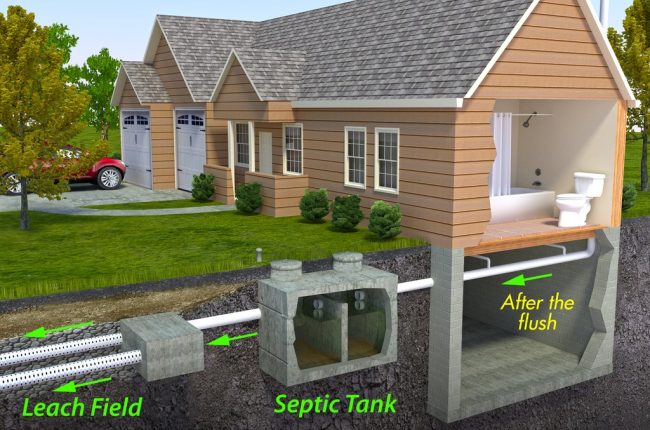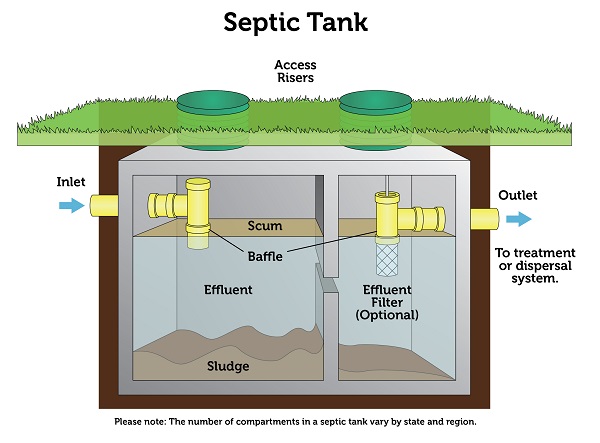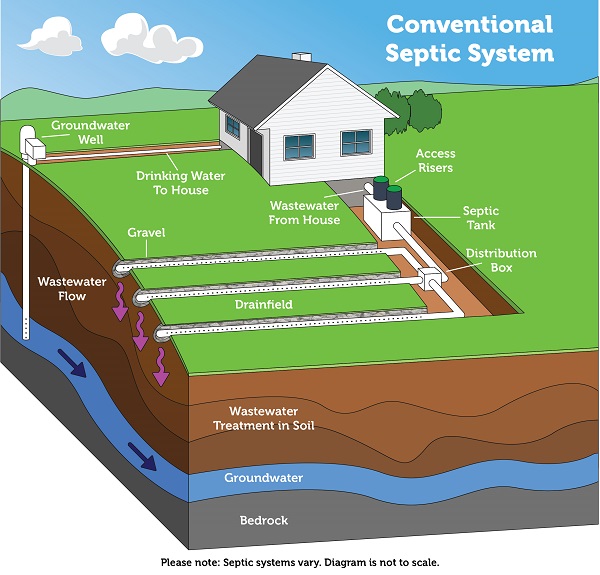Why Maintain Your Septic System
Maintaining Your Septic System…
Saves you money
Regular maintenance fees of $250 to $500 every three to five years is a bargain compared to the cost of repairing or replacing a malfunctioning system, which can cost between $3,000 and $7,000 for a conventional system. Alternative systems can cost even more. The frequency of pumping required for each system depends on how many people live in the home and the size of the system.
Protects your property value
An unusable septic system or one in disrepair will lower your property value, and potentially can pose a costly legal liability.
Keeps you and your neighbors healthy
Household wastewater contains disease causing bacteria and viruses and high levels of nitrogen and phosphorus. If a septic system is well-maintained and working properly, it will remove most of these pollutants. Insufficiently treated sewage from septic systems can cause groundwater contamination, which can spread disease in humans and animals. Improperly treated sewage poses the risk of contaminating nearby surface waters threatening swimmers with various infectious diseases, from eye and ear infections to acute gastrointestinal illness and hepatitis.
Protects the environment
More than four billion gallons of wastewater are dispersed below the ground’s surface every day. Ground water contaminated by poorly or untreated household wastewater poses dangers to drinking water and to the environment. Malfunctioning septic systems release bacteria, viruses, and chemicals toxic to local waterways. When these pollutants are released into the ground, they eventually enter streams, rivers, lakes, and more, harming local ecosystems by killing native plants, fish, and shellfish.
How Your Septic System Works

Septic systems are underground wastewater treatment structures, commonly used in rural areas without centralized sewer systems. They use a combination of nature and proven technology to treat wastewater from household plumbing produced by bathrooms, kitchen drains, and laundry.
A typical septic system consists of a septic tank and a drainfield, or soil absorption field.

The septic tank digests organic matter and separates floatable matter (e.g., oils and grease) and solids from the wastewater. Soil-based systems discharge the liquid (known as effluent) from the septic tank into a series of perforated pipes buried in a leach field, chambers, or other special units designed to slowly release the effluent into the soil.
Alternative systems use pumps or gravity to help septic tank effluent trickle through sand, organic matter (e.g., peat and sawdust), constructed wetlands, or other media to remove or neutralize pollutants like disease-causing pathogens, nitrogen, phosphorus, and other contaminants. Some alternative systems are designed to evaporate wastewater or disinfect it before it is discharged to the soil

Conventional System
A decentralized wastewater treatment system consisting of a septic tank and a trench or bed subsurface wastewater infiltration system (drainfield). A conventional septic system is typically installed at a single-family home or small business.
The gravel/stone drainfield is a design that has existed for decades. The name refers to the construction of the drainfield. With this design, effluent is piped from the septic tank to a shallow underground trench of stone or gravel. A geofabric or similar material is then placed on top of the trench so sand, dirt, and other contaminants do not enter the clean stone.
Effluent filters through the stone and is then further treated by microbes once it reaches the soil below the gravel/stone trench.
Gravel/stone systems are relatively large in overall footprint and may not be suitable for all residential sites or conditions.
How to Maintain Your Septic System
You can make sure your septic system lasts longer by making sure to never flush tampons, paper towels, baby wipes, or really any foreign objects that cannot break down easily in your septic system.
Use a garbage disposal, if you have one, to help break down any food that will clog the pipes. Make sure you never put grease down the sink, as that can clog up the septic tank.
Find a laundry detergent that’s safe for septic systems as well.
Small amounts of bleach are okay to have in your septic tank, but never flush medication, anti-freeze or harmful chemicals, as they damage the bacteria in your septic system which creates issues down the road.
If you have a sump pump, make sure that it is not hooked up to the septic system. Sump pumps put too much water into the septic system which can have adverse effects on how it breaks down the waste.